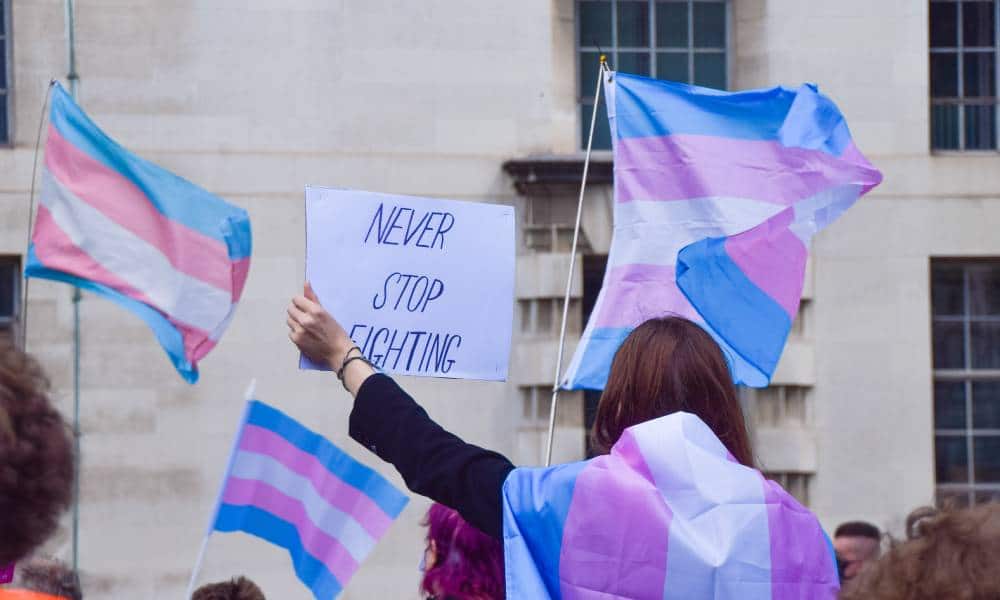Access to gender-affirming hormone therapy in adolescence is associated with better mental health outcomes for transgender adults, according to a new study.
The research, published Wednesday in the peer-reviewed journal PLOS One, was based on data from the 2015 U.S. Transgender Surveyconducted by the National Center for Transgender Equality, which surveyed more than 27,000 trans people across the country. It compared the psychological distress and suicidal thoughts experienced by 12,738 trans adults who had access to gender-affirming hormones during early adolescence, late adolescence or adulthood with 8,860 trans adults who desired hormones but never had access to them.
Trans people who had access to gender-affirming hormones between the ages of 14 and 17 saw their odds of negative mental health outcomes decrease significantly. Access to gender-affirming hormones during this period was associated with a third of the odds of severe psychological distress in the past month and half the odds or less of suicidal ideation in the past year when compared to trans people who wanted hormones but never accessed them, according to study co-author Dana King, data programmer and analyst for The Fenway Institute at Fenway Health, a Boston-based LGBTQ health care and research organization.
And while those who had access to gender-affirming hormones as adults also had lower odds of past-month severe psychological distress and suicidal ideation, the difference was not as stark, the report found.
Dr. Alex S. Keuroghlian, the study’s senior author and director of the National LGBTQIA+ Health Education Center at The Fenway Institute and the Massachusetts General Hospital Psychiatry Gender Identity Program, said the study’s results show the dangers of state legislation that attempts to ban gender-affirming medical care, including hormones, for trans minors.
“These results argue against waiting until adulthood to offer gender-affirming hormones to transgender adolescents and suggest that doing so may put patients at greater mental health risk,” Keuroghlian said in a news release. “They also add to the growing evidence base suggesting that legislation restricting transgender adolescents’ access to gender-affirming medical care would result in adverse mental health outcomes.”
More than 20 states considered bills last year that would ban gender-affirming health care for transgender minors, according to the American Civil Liberties Union. Only Arkansas passed a law completely banning access to gender-affirming health care, including puberty blockers and hormones, for trans minors, but a judge blocked that law from taking effect in July pending the outcome of litigation. Tennessee enacted a more limited law that bans doctors from providing gender-affirming hormone treatment and surgery to prepubescent minors.
A recent poll by The Trevor Project, an LGBTQ youth suicide prevention and crisis intervention group, found that just the public discussion about affected trans and nonbinary youths’ mental health. Eighty-five percent of trans and nonbinary youths, and two-thirds of all LGBTQ youths, said recent debates about anti-trans state laws negatively affected their mental health.
At least seven states introduced anti-trans bills in the first week of the year, including some that limit trans youths’ access to gender-affirming health care.
Supporters of the bills argue that such health care is “experimental” and that trans young people shouldn’t be able to access it until they are adults.
However, in addition to the new study published in PLOS One, a growing body of evidence — also based on the 2015 U.S. Transgender Survey — has found that earlier access to gender-affirming care such as puberty blockers, hormones and surgery has positive mental health outcomes, and that delaying access to such care can lead to negative outcomes, including an increased risk of suicidal thoughts.
Research published in JAMA Psychiatry in September 2019 found that exposure to “conversion therapy,” a discredited practice that seeks to change a trans person’s gender identity, is associated with suicidal thoughts and suicide attempts.
Recommended
Another study, published in the journal Pediatrics in January 2020, found that trans people who received puberty blockers during adolescence had a lower risk of suicidal thoughts as adults compared to those who wanted puberty blockers but couldn’t access them.
And a third study, published last year in JAMA Surgery, found that trans people who had not received the gender-affirming surgery they desired were nearly twice as likely to report severe psychological distress and suicidal thoughts, and also reported higher incidences of binge drinking and tobacco use.
Trans people often can’t access or must delay accessing gender-affirming care for a variety of reasons. Nearly 1 in 5 trans people are uninsured, according to a 2020 study by the Kaiser Family Foundation. Even when they are insured, a report last year from the Center for American Progress found that 40 percent of transgender respondents — and 56 percent of trans respondents of color — said their health insurance companies denied coverage for gender-affirming care, which includes treatments like hormones and surgery.
CAP’s survey also found that nearly half of transgender people — and 68 percent of transgender people of color — reported having experienced mistreatment at the hands of a medical provider, including refusal of care and verbal or physical abuse, in the year before the survey, which took place in June 2020.
Jack Turban, a lead author on the recent PLOS One study and chief fellow in child and adolescent psychiatry at the Stanford University School of Medicine, said the new research highlights that the U.S. “has failed to make gender-affirming medical care accessible.”
“We urgently need to work on training more clinicians and combatting insurance discrimination,” Turban said, adding that “lack of access to gender-affirming medical care could drive the use of nonprescribed gender-affirming hormones through the purchase of hormones online or on the black market without medical monitoring, which may lead to adverse physical health outcomes.”
The study found that a significant portion, 41 percent, of trans people who desired gender-affirming hormones were unable to access them at all. It also found that rates of suicidal ideation in the past year were still high among all trans people — including those who had access to gender-affirming hormones — compared to the general population.
“Transgender people face a range of other psychosocial stressors that contribute to chronic minority stress, including but not limited to employment discrimination, lack of safe access to public facilities, and physical violence,” the study states.
It calls for future epidemiological and interventional research to understand and address chronic minority stress among trans people who can access gender-affirming hormones and those who can’t. For trans adolescents, the study says “creating safe and affirming school environments appears to be of particular importance, in addition to providing gender-affirming medical care, as well as psychological, legal and surgical gender affirmation as needed.”
If you or someone you know is at risk of suicide, please call the National Suicide Prevention Lifeline at 800-273-8255, text TALK to 741741 or visit SpeakingOfSuicide.com/resources for additional resources.



